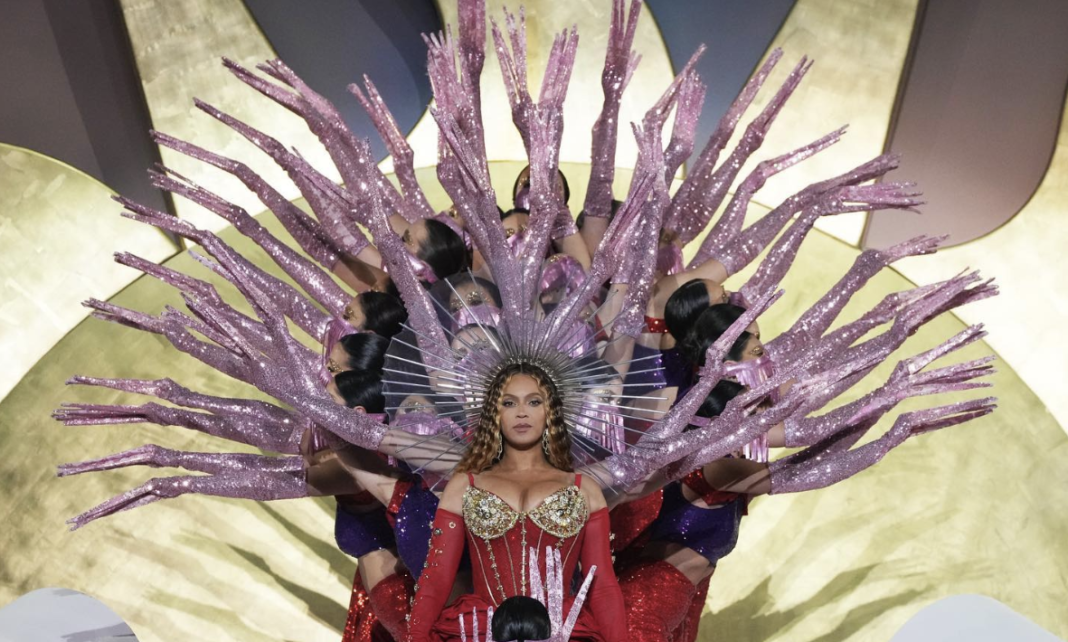At this point, everybody knows that an era-opening performance from Beyoncé is going to go down in history. Shrouded in secrecy, Knowles-Carter returned to the stage last week in the form of an appearance at the unofficial opening of Atlantis The Royal, a luxury Dubai hotel. Phones were banned, but that hasn’t stopped the internet – including Lizzo – poring over leaked snippets of its content, in what looked like a show of delectably high standards, all fire and ice and vocals that could supposedly be heard eight miles down the road.
While fans naturally pored over the first new live Beyoncé footage of this era, others were more concerned about the incompatibilities between the themes of Beyoncé’s latest album, and that of Dubai’s record of LGBTQIA+ inclusivity. A love letter to Black queer ballroom culture, ‘Renaissance’ was praised upon its release for its unapologetic advocacy for marginalised communities, championing fun and love and acceptance. While it may be noted that there have been no officially-recorded arrests or prosecutions for same-sex sexual activity in the country since 2015, Dubai still has a reputation for hostility towards LGBTQIA+ sexuality, with legal regulations that state that anybody who is perceived to be ‘cross-dressing’, engaging in same-sex activity or otherwise advocating for LGBTQ rights could be deported, imprisoned or even potentially subjected to the death penalty under Sharia Law. Somewhat unsurprisingly in this context, Beyoncé left her rousing ‘Renaissance’ tunes at home in favour of showing Dubai her more demure side (a cover of Etta James ‘At Last’, the live return of ‘Beautiful Liar’, several songs from her Lion King soundtrack), but the contrast between her recent releases and the first gig of her new era still jarred for some.
For others, it’s less about where you’re performing, and more about who you’re performing for. After all, this wasn’t necessarily an open concert in which working-class queer Emiratis could come to feel accepted, which might have felt more in line with ‘Renaissance’’s message. Instead, it appears that most of the guests were from the upper echelons of Dubai hospitality and property industries, or influencers and celebrities that were invited in from the US. Given that Dubai’s luxury industry is rife with allegations about horrific working conditions for the kinds of low-income migrants who build much of the city’s infrastructure, Beyoncé has been critiqued for a kind of tone deafness, overlooking the kind of labour that may have gone into building this hotel in favour of adding to her already impressive wealth.
It is of course unknown exactly what Knowles-Carter plans to do with the estimated $19.3-24 million that she is rumoured to have been paid for this appearance, but this wouldn’t be the first time that she has been in controversy for decisions that appear to put profit before people. In 2021, she faced backlash for (apparently unknowingly) sporting a blood diamond for a Tiffany jewellery campaign, while in 2022 her and Jay Z were called out for hosting an Oscars afterparty at Bar Marmont, crossing the picket line of Chateau Marmont workers who were at the time hoping to take a stand against an array of workplace issues including systematic racial discrimination and sexual misconduct. Beyoncé is of course not responsible for the root cause of these issues, but in the context of somewhat regular examples, some feel that the activist spirit of her music is undermined by her on-the-ground actions, creating a disappointing disconnect.
On Twitter, there are still many more defendants of Beyoncé than there are detractors, given the size of her vocal stan community. While the Beyhive does seem to broadly acknowledge the issue, many feel that their idol is being unfairly targeted, not least because Kylie Minogue, a fellow LGBT-beloved icon, recently hosted a similarly glitzy NYE party at Dubai’s Atlantis The Palm, while Lady Gaga, Elton John and Madonna have all also performed in the UAE in previous years. Some have also pointed out that America very much has its own problems; if artists should be expected to boycott Dubai on the grounds of regressive politics, what does this mean for touring in the southern states? This show may not have been an accessible choice for everyone, but it was a private event rather than an official Renaissance tour date, and it makes some logistical sense that she might ease herself back in with an audience of personally-invited celebs in a foreign country rather than pen-wielding critics in the paparazzi-crazed US, especially given her recently-reported foot surgery.
In the face of criticisms that she had ‘dampened down’ her Blackness for Dubai by not bringing out her usual team of dancers, fans have also pointed out that the Lebanese troupe she worked with are actually America’s Got Talent winners, choreographed for the occasion by fellow Lebanese dancer Andrew Makasdi, the creative director of Beyoncé’s Parkwood Entertainment. Far from abandoning her usual Black team members, she was likely just giving them a break before the Renaissance world tour can begin, creating game-changing career opportunities for others in the interim. A less convincing Beyhive argument, but an argument nonetheless, was that performers should simply be expected to do their jobs and nothing more, entertaining for money without wading into the politics. If you don’t like it, some Beyhivers say, it’s a good thing that you were never important enough to be invited anyway.
Where you stand on Dubai-gate is entirely down to personal ethics, but it’s fair to say that discussion around ‘appropriate’ regions to perform in is perhaps more nuanced than it initially seems. In an interview with TMZ, Beyoncé’s own father, Matthew Knowles, has defended the performance on the grounds of its potential unity-making, stating that his daughter has “always stood for inclusiveness” and would “never do something to deliberately hurt someone.” Given recent negative media attention around David Beckham’s lucrative endorsement of the Qatar World Cup, some feel that it is important that Beyoncé receives the same heat, while stans on the other side of the argument are completely fed up, feeling that press and critics are always looking for clickbaity ways to undermine her talent.
In some ways, they might have a point. Is Beyoncé getting more heat as a Black woman than her white predecessors who have also performed in the country? Very possibly. Are music critics guilty of only appearing to care about human rights issues when we’ve got a successful pop star to gossip about? It could certainly look that way, yes. But we also have to acknowledge that society is changing; in today’s climate, we are far more tuned in to the idea that stars might be virtue-washing without truly practising what they preach. Sometimes this results in targeted ‘cancellation’ campaigns, but more often, it is simply a case of pointing out that some actions seem a little concerning, and deserve to be explored or thought upon in more detail. Calling Beyoncé out on her Dubai performance is not the same as cancelling her, or throwing any question on her remarkable talent. It is merely proving that under glorified capitalism, even the most progressive-seeming artists may sometimes make dubious decisions in their desire to secure the personal bag.
As 2023 unfolds, the Renaissance Tour will begin and no doubt be an international success, resigning this ‘scandal’ to a mere Wikipedia footnote. We’re seeing it already; memes of her interrupting Blue Ivy’s dancing or TikTok duets imitating her impeccable new ‘Drunk In Love’ vocal run are already shifting conversation away from the human rights angle, revealing our uncanny capacity to feel outraged and entertained all at once. Stans are going to stan, just as news cycles are going to cycle. But what we all need to recognise is that while there might be no definitive answers, no total ethical high ground in which anybody can say their take is entirely right and perfect, there should also be no pedestal high enough to put any artist above the possibility of reasonable, balanced critique. Not even Queen B.
READ MORE: Beyoncé’s ‘Renaissance’ is a thrilling celebration of Black queer culture







